Book
Year: 1930 Publisher: Paris M. Lac
Abstract | Keywords | Export | Availability | Bookmark
 Loading...
Loading...Choose an application
- Reference Manager
- EndNote
- RefWorks (Direct export to RefWorks)
Book
Abstract | Keywords | Export | Availability | Bookmark
 Loading...
Loading...Choose an application
- Reference Manager
- EndNote
- RefWorks (Direct export to RefWorks)
Book
ISBN: 2872821791 9782872821792 Year: 1997 Volume: 6 Publisher: Carnières Lansman
Abstract | Keywords | Export | Availability | Bookmark
 Loading...
Loading...Choose an application
- Reference Manager
- EndNote
- RefWorks (Direct export to RefWorks)
Texte français et adaptation du texte d'Euripide.
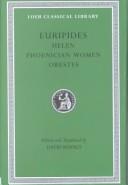
ISBN: 0674996003 9780674996007 Year: 2002 Volume: 5 11 Publisher: Cambridge : Harvard University Press,
Abstract | Keywords | Export | Availability | Bookmark
 Loading...
Loading...Choose an application
- Reference Manager
- EndNote
- RefWorks (Direct export to RefWorks)
Euripides (c. 485-406 BCE) has been prized in every age for his emotional and intellectual drama. Eighteen of his ninety or so plays survive complete, including Medea, Hippolytus, and Bacchae, one of the great masterpieces of the tragic genre. Fragments of his lost plays also survive.
Helen of Troy (Greek mythology) --- Seven against Thebes (Greek mythology) --- Orestes (Greek mythology) --- Seven against Thebes --- Thebes, Seven against (Greek mythology) --- Mythology, Greek --- Euripides --- Greek drama (Satyr play) --- Greek drama (Tragedy) --- Greek drama --- Mythology, Greek, in literature --- Tragedy --- Greek mythology --- Satyric drama, Greek --- Ėvripid --- Yūrībīdīs --- Euripide --- Euripedes --- Eŭripido --- Eurypides --- Euripidesu --- אוריפידס --- エウリーピデース --- Εὐριπίδης --- Helen, --- Orestes, --- Orest, --- Orestas, --- Oreste, --- Oresti, --- Oresto, --- Oresztész, --- オレステース, --- אורסטס --- 오레스테스, --- اورستس --- Орест, --- Ὀρέστης, --- Elena, --- Helena, --- Helenē, --- Yelena, --- 海伦 , --- ヘレネー, --- הלנה, --- העלענע, --- 헬레네, --- Хелена, --- Єлена, --- Елена , --- هلن, --- هيلين, --- Ἑλένη, --- Drama --- Greek literature --- Dionysia --- Helen of Troy (Greek mythology) - Drama --- Seven against Thebes (Greek mythology) - Drama --- Orestes (Greek mythology) - Drama
Book
ISBN: 9783110229455 3110229455 9786613165312 1283165317 3110229463 Year: 2010 Volume: 34 Publisher: Berlin ; New York : De Gruyter,
Abstract | Keywords | Export | Availability | Bookmark
 Loading...
Loading...Choose an application
- Reference Manager
- EndNote
- RefWorks (Direct export to RefWorks)
In medieval Byzantium Hecabe was Euripides' most popular tragedy, so that it is this play for which we have the most manuscripts. Although this means that the production of a critical editionto satisfymodern criteria is particularly difficult, such an edition can now be presented. It comprises a revised text, a collection of testimonials, an extensive textual criticism, a prose translation, an introduction that pays particular attention to the history of the transmission and the reception of the text, an extended commentary and metrical analyses of the lyrical passages.
Hecuba (Legendary character) --- Hecube (Personnage légendaire) --- Drama. --- Théâtre --- Euripides. --- Hecube (Personnage légendaire) --- Théâtre --- Hecuba, --- Ecuba, --- Hecabe, --- Hécube, --- Hekaba, --- Hekabē, --- Hekabo, --- Hekuba, --- 赫库芭, --- ヘカベー, --- הקובה, --- 헤카베, --- Гекаба, --- Гекуба, --- Хекаба, --- Хекуба, --- هکابه, --- هيكوبا, --- Ἑκάβη,
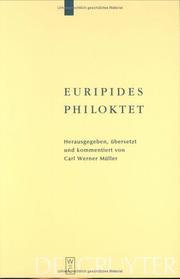
ISBN: 3110163489 9783110163483 3110808021 Year: 2000 Volume: 21 Publisher: Berlin ; New York, NY : Walter de Gruyter,
Abstract | Keywords | Export | Availability | Bookmark
 Loading...
Loading...Choose an application
- Reference Manager
- EndNote
- RefWorks (Direct export to RefWorks)
Greek drama (Tragedy) --- Tragédie grecque --- History and criticism --- Histoire et critique --- Euripides --- Philoctetes. --- Literatura grega (crítica e interpretação) --- Euripides. --- EurÍpedes --- Euripide, 480-406 av. J.-C. --- Criticism and interpretation. --- Literatura grega (crítica e interpretação). --- EurÍpedes, --- Tragédie grecque --- Philoctetes (Greek mythology) --- Mythology, Greek --- Ėvripid --- Yūrībīdīs --- Euripide --- Euripedes --- Eŭripido --- Eurypides --- Euripidesu --- אוריפידס --- エウリーピデース --- Εὐριπίδης
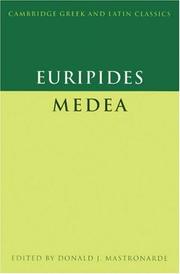
ISBN: 0521643864 0521643651 9780521643658 9780521643863 Year: 2002 Publisher: Cambridge, UK New York : Cambridge University Press,
Abstract | Keywords | Export | Availability | Bookmark
 Loading...
Loading...Choose an application
- Reference Manager
- EndNote
- RefWorks (Direct export to RefWorks)
Medea (Greek mythology) --- Euripide, --- Medea (Greek mythology) - Drama.
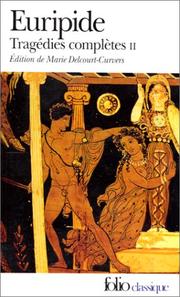
ISBN: 2070381927 2070381919 9782070381913 9782070381920 Year: 1995 Volume: 2104-2105 Publisher: Paris : Gallimard,
Abstract | Keywords | Export | Availability | Bookmark
 Loading...
Loading...Choose an application
- Reference Manager
- EndNote
- RefWorks (Direct export to RefWorks)
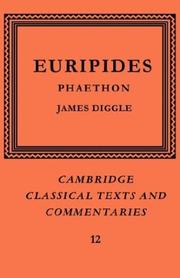
ISBN: 0521604249 0521077001 9780521077002 Year: 1970 Volume: 12 Publisher: Cambridge : Cambridge University Press,
Abstract | Keywords | Export | Availability | Bookmark
 Loading...
Loading...Choose an application
- Reference Manager
- EndNote
- RefWorks (Direct export to RefWorks)
Phaethon (Greek mythology) in literature --- Phaethon (Greek mythology) --- Phaethon (Greek mythology) in literature. --- -Phaethon (Greek mythology) in literature --- Phaeton (Greek mythology) --- Tragedy --- Drama --- Mythology, Greek --- Euripides. --- Euripides --- Tragedy. --- Drama. --- Greek drama (Tragedy) --- Tragédie grecque --- Mythologie grecque --- Théâtre --- Criticism and interpretation. --- Phaethon (Greek mythology) - Drama --- Euripides - Phaethon
Book
ISBN: 9780521596565 9780521593618 0521596564 Year: 2019 Publisher: Cambridge : Cambridge University Press,
Abstract | Keywords | Export | Availability | Bookmark
 Loading...
Loading...Choose an application
- Reference Manager
- EndNote
- RefWorks (Direct export to RefWorks)
Greek drama (Tragedy) --- Mythology, Greek --- Euripides. --- Ion --- Drama --- Drama. --- Mythology, Greek - Drama --- Euripides. - Works. - Greek --- Ion - (Mythological character) - Drama --- Ion - (Mythological character)

 Search
Search Feedback
Feedback About UniCat
About UniCat  Help
Help News
News